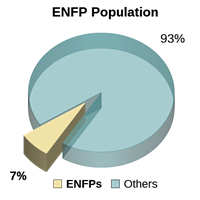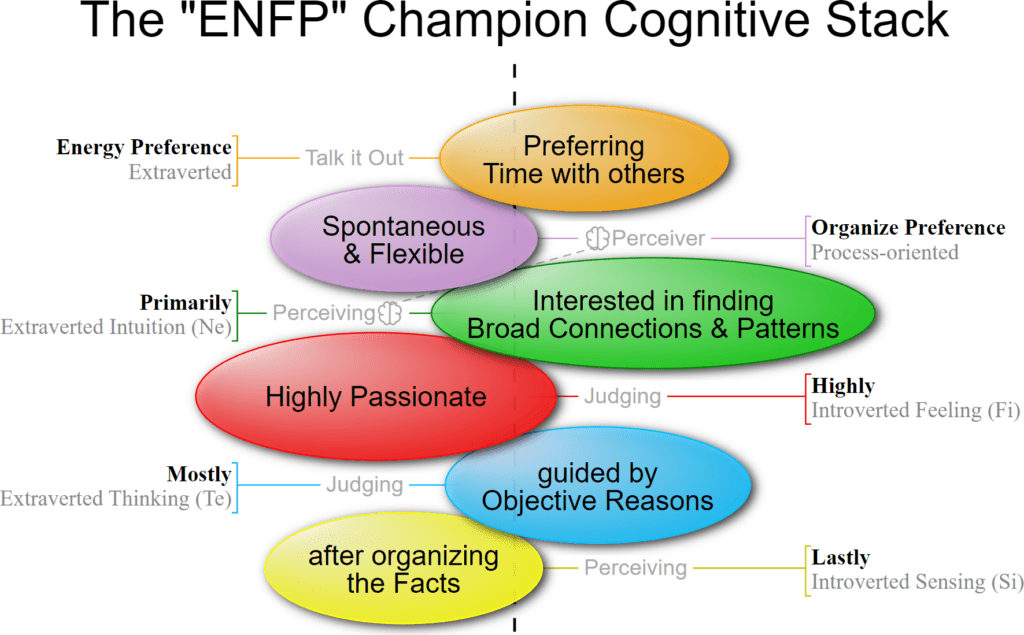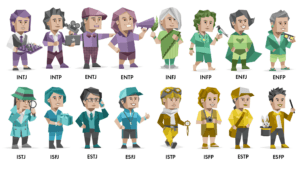The ENFP Champion Personality Type

People with ENFP Personality types are often described as enthusiastic, energetic, and independent.
They are often described as charismatic and charming,
They do best in situations where they can be creative and innovative.
With Extraverted Intuition as their dominant and top extraverted function, Champions are Perceivers primarily interested in broad concepts and patterns.
With their Introverted Feelings as their principal Judging function, Champions are highly passionate, follow their feelings, and use personal subjective values when making decisions.

Champions consider how others think with objective reasoning and extroverted Thinking, and they like to organize the facts with their extroverted sensing’s lowest function.
Champions are extraverted, preferring time with others to discuss things. They are process-oriented, spontaneous, and flexible.
Champions are “Abstract Perceivers” with Introverted Feelings and Extraverted Intuition. When feeling threatened, they will use logically unconnected messages through nonsequiturs in their speech and may behave with the Distractor Satir Communication Style.
ENFP Personality Type Cross-reference
- Keirsey Type – Champion
- Temperament Type – Phlegmatic
- Animal Type – Otter
- DISC Type – Influential
- Socio-Communicative Type – Expressive
- True Colors – Blue
- Color Code – Blue
- Personality Compass – West
- Occupational Type – Artistic
- Learning Type – Reflector
- Leadership Type – Collaborator
Enneagram Types
The Enneagram is a Personality Typing System comprising nine different types.

Dominant Function – Extraverted Intuition
- They generally focus on the world of possibilities.
- They are good at abstract Thinking and prefer not to concentrate on tiny details.
- They are inventive and focused on the future.
- They are good at seeing things as they might be rather than focusing simply on what they are.
- They naturally focus on relationships and are skilled at finding patterns and connections between people, situations, and ideas.
Auxiliary Function – Introverted Feeling
- They value feelings and values more than logic and objectivity.
- They follow their heart, empathize with others, and let their emotions guide their decisions.
- They strongly desire to be true to themselves and their values.
- In an ideal world, their world would be congruent with their values.
Tertiary Function – Extraverted Thinking
- This cognitive function is centered on logically organizing information and ideas.
- When looking at information, they may use this function to sort through disparate data to spot connections efficiently.
- For example, they might “think out loud” as they work through a problem, laying out all the information to create a quickly followed train of thought.
Inferior Function – Introverted Sensing
- They express this function by comparing what they are experiencing to past experiences.
- In doing so, they can often call to mind memories, feelings, and senses that they associate with those events.
- This allows individuals to seek patterns and form expectations for future events based on their experiences.
ENFP Traits
- They are animated, inspiring, and innovative.
- They are charming, for which most ENFPs are outgoing and friendly.
- They are good at understanding other people’s feelings, making it easy for them to connect with others.
- They convey themselves to other people through speech, mannerisms, and expression.
- In new relationships, they strive to be the center of attention.
- Their judgment usually inspires humor, but if their feelings are too open, they may drive people away.
- Their primary function is Extraverted Intuition, which makes them people-oriented. In contrast, their auxiliary function is Introverted Feeling.
- They enjoy ideas and people but also have a short attention span and many emotional needs.
- They can be severe and intellectual.
- Still, at the same time, they can be eagerly playful.
- Weaknesses include their extreme dislike of conflict and criticism, to which they can respond with intense emotions.
- This is because they strive for harmony and cannot tolerate situations that do not go their way.
- They tend to be smothering because of their enthusiastic demeanor.
- In addition to having an abundance of enthusiasm, they genuinely care about others.
- Given their zeal, charisma, and creativity, they can also make great leaders.
- They are flexible and like to keep their options open.
- They can be spontaneous and are highly adaptable to change.
- They strongly dislike routine and may have problems with disorganization and procrastination.
- They can become easily distracted, mainly when working on something dull or uninspiring.
- They prefer to focus on the future.
- They enjoy dreaming up ideas, but not seeing them through to completion is a common problem.
- While they are great at generating new ideas, they sometimes put off important tasks until the last minute.
Strengths
- Warm and enthusiastic
- Empathetic and caring
- Strong people skills
- Strong communication skills
- Fun and spontaneous
- Highly creative
Weaknesses
- Needs approval from others
- Disorganized
- They tend to get stressed out easily
- They can be overly emotional
- Overthinks
- Struggles to follow rules
ENFP Relationships
Friendships
- They make fun and exciting friends.
- They enjoy doing new things and usually have a wide circle of friends and acquaintances.
- They are perceptive of other people’s feelings.
- They are good at understanding other people quite quickly.
- You can help your ENFP friends by providing emotional support to help them achieve their goals.
Personal Relationships
- They are extraverts, meaning they love spending time with other people.
- Socializing gives them more energy, helping them feel renewed, refreshed, and excited about life.
- Other types of extraverts tend to dislike solitude.
- They need time to think and reflect.
- They tend to be warm and passionate in relationships.
- As extraverts, they are naturally upbeat and gregarious.
- In relationships, they always seek growth and ways to strengthen their partnerships.
- They tend to be attentive and spontaneous.
- Their willingness to take risks can sometimes be stressful for those who love them.
Partner Relationships
- They tend to be passionate and enthusiastic in romantic relationships.
- Long-term relationships can sometimes hit a snag because people with this personality type always think about what is possible rather than simply focusing on things as they are.
- To keep the romance alive, looking for new ways to bring excitement into the relationship is essential.
Parenting
- Because ENFPs dislike routine, their children may sometimes perceive them as inconsistent.
- However, they typically have strong, loving relationships with their kids and are good at imparting their sense of values.
- Parents of ENFP children will find their child has a strong imagination and great enthusiasm for life.
- Although your child’s energy may seem overwhelming sometimes, you should find ways to help them explore their creativity.
- One struggle they may face is providing structure and limits.
- While they recognize the need for such things, they are not always good at setting or enforcing such limitations.
- Parents of ENFPs should encourage their kids to be creative but provide rules and guidelines.
ENFP Careers
- People with the ENFP personality type do best in jobs with a lot of flexibility.
- Because they are empathetic and interested in people, they often do well in service-oriented careers.
- They should avoid careers that involve completing many detailed, routine tasks.


